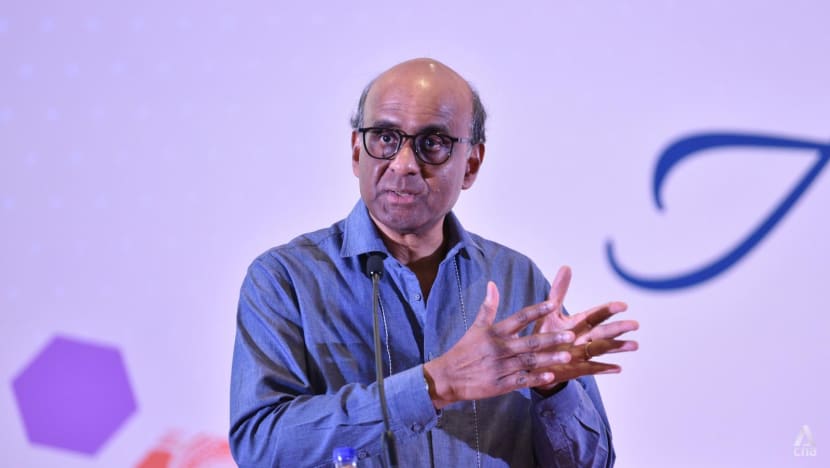Important to strengthen spoken language competencies among Singaporeans: Tharman
Learning some Mandarin and Malay for everyday conversation will be helpful, not just within Singapore, but also for doing business in Southeast Asia, says former Senior Minister Tharman Shanmugaratnam.

SINGAPORE: It is important to strengthen spoken language competencies among Singaporeans, said former Senior Minister Tharman Shanmugaratnam on Friday (Jul 21).
Speaking at a Racial Harmony Day event where he was the guest of honour, Mr Tharman said that learning some Mandarin and Malay in particular for everyday conversation will be helpful, not just within Singapore, but also as Singapore focuses more on the region.
"I believe we can do it, it's not impractical. And we have to place more emphasis on it," he added.
The event was organised by the Singapore Chinese Chamber of Commerce & Industry, Singapore Indian Chamber of Commerce & Industry, and Singapore Malay Chamber of Commerce & Industry.
Mr Tharman recalled how during his time as education minister, he had introduced the Conversational Chinese and Malay (CCM) Programme in schools where students could learn a different mother tongue.
"After a while, because it was not examinable and I didn't want to make it an examinable subject, nature took its course and there was less emphasis placed (on it)," said Mr Tharman, who was Minister for Education from 2003 to 2008.
"But this should be seen as part of the mission of education."
In a speech earlier in the afternoon, Mr Tharman reiterated that Singapore is a multiracial nation built on two spaces - on the cultures and languages of the different races, and a common, neutral space where each community has to make some compromises.
However, he added that there is a need for a third space, where Singaporeans participate in each other's cultures.
"That third space needs to be developed. It is not a melting point, it is learning another culture and taking it very seriously," he said. "Whether it is art or dance or music or even language, you have to take seriously the other cultures."
Last month, Mr Tharman announced his intention to run for the Singapore presidency. President Halimah Yacob’s six-year term expires on Sep 13 and she has said she will not stand for re-election.
The Elections Department has said that the Presidential Election may be held at any time from Jun 13, and if it has not been held by the expiration of the term of the incumbent President, it should be held shortly after.
A total of three candidates - former GIC chief investment officer Ng Kok Song, businessman George Goh, and Mr Tharman have announced their bids for the presidency.
THE GROWING IMPORTANCE OF SOUTHEAST ASIA
Mr Tharman noted that with the world becoming more "turbulent", the region around Singapore will become more important in the next 5 to 10 years.
Southeast Asia is a region where there is an "openness" to trade and investment, and a "desire to grow" by making use of markets abroad and by inviting investments into their own countries, he added.
"This is a big advantage because it is not true in many other parts of the world," he said. "So we will have to place more emphasis on the region around us in the years to come."
There is a growth opportunity, and it will be important to understand the region well, he added.
Some ability to speak Mandarin or Malay is useful in the business context, Mr Tharman added.
"Many of our businesses have been relying on Malaysian Chinese to speak Malay to do their business in Southeast Asia. Surely we can also develop more Malay language competence in our own Singaporean population," he said.
"We need stronger, oral Malay competence in our population. It doesn't need to be everyone, but we need enough of all the races, besides of course the Malays, being able to speak passable Malay ... being able to have a simple conversation."
As part of integration efforts, it is also important that Singapore makes more use of existing school clusters so that students of different schools and races can participate in co-curricular activities (CCA), Mr Tharman added.
At the same time, it is important to retain the "foundational tradition" of Special Assistance Plan (SAP) schools, but innovate at the "boundaries".
Mr Tharman added that his four children who studied in SAP schools, also went out of their way to make non-Chinese friends after school and through their CCAs.
"I think we should try to make it easier for that to happen," he added.
















